 In the wake of the UN's blistering offensive against nuclear proliferation lead by the new head of the UN Security Council, President Obama, Iran responded in a manner more suiting to North Korea. The fact of the matter is that Iran is beginning to squirm under the pressure and their actual power in the structure of world powers is beginning to emerge along with their grasp of the diplomatic process.
In the wake of the UN's blistering offensive against nuclear proliferation lead by the new head of the UN Security Council, President Obama, Iran responded in a manner more suiting to North Korea. The fact of the matter is that Iran is beginning to squirm under the pressure and their actual power in the structure of world powers is beginning to emerge along with their grasp of the diplomatic process.In my last post, I talked about the subtleties of diplomacy between Russia and the US. When it comes to the subject, Russia and the US have a long and rich history and provide us with a wealth of diplomatic back and forth from which we can perceive plenty of patterns and innuendo. But, the fact of the matter is that the relationship between Russia and the US is unique because it involves complex economic and military elements. Also, while the Cold War helped revolutionize the diplomatic process, it is more of an exception than a rule due to its one-of-a-kind nature. What we see in the back and forth between Russia and the US is like a ballet or a game of chess.
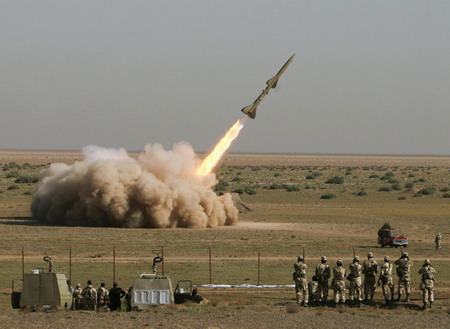 When it comes to countries like Iran or North Korea, diplomacy is more like a bull fight. North Korea is notorious for agreeing to terms and then reversing course, usually with a new round of missile tests and public condemnations of the West. They employ this strategy because, in the past, it gives them short term leverage to get resources including food, medical supplies, and oil. Iran, faced with becoming as isolated as North Korea, is beginning to adopt the same strategy in order to fight off a new round of international sanctions.
When it comes to countries like Iran or North Korea, diplomacy is more like a bull fight. North Korea is notorious for agreeing to terms and then reversing course, usually with a new round of missile tests and public condemnations of the West. They employ this strategy because, in the past, it gives them short term leverage to get resources including food, medical supplies, and oil. Iran, faced with becoming as isolated as North Korea, is beginning to adopt the same strategy in order to fight off a new round of international sanctions.After the recent meetings on nuclear proliferation, Iran has issued biting criticism of the UN, saying that they are simply following orders from Western powers, while re-affirming their rights to nuclear energy in the same breath. They followed up their public rantings with a fresh round of missile tests, showing off a new short range missile that wouldn't take too much modification to be nuclear capable. Together, these two events show that Iran is becoming desperate. Instead of engaging the UN and following through on their promise to open up their sites to IAEA inspection, Iran issues blistering criticisms and puts on the military version of a dog and pony show, thinking that it will get them some kind of leverage.
 The gut check here is one of chagrin. Things got a lot worse for North Korea before they got any kind of material concessions from the West. Considering the the fact that the recently revealed secret nuclear facility is near a military base, Iran's "diplomatic gestures" are more likely to induce a new round of sanctions than elicit concessions. While the Western world hasn't reached a consensus on the status of Iran's nuclear weapons program, things certainly aren't looking peaceful, especially since Iran still hasn't opened up any of their facilities to IAEA inspection, including the not-so-secret facility. Maybe now, Russia won't be so suspicious of our mobile missile interceptors.
The gut check here is one of chagrin. Things got a lot worse for North Korea before they got any kind of material concessions from the West. Considering the the fact that the recently revealed secret nuclear facility is near a military base, Iran's "diplomatic gestures" are more likely to induce a new round of sanctions than elicit concessions. While the Western world hasn't reached a consensus on the status of Iran's nuclear weapons program, things certainly aren't looking peaceful, especially since Iran still hasn't opened up any of their facilities to IAEA inspection, including the not-so-secret facility. Maybe now, Russia won't be so suspicious of our mobile missile interceptors.


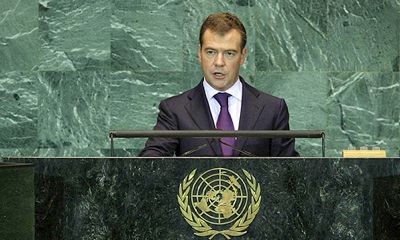







 The newest arrival to the nuclear proliferation party is no longer trouble-making Iran. After his recent meeting with Russian President Dmitry Medvedev, Venezuelan President Hugo Chavez
The newest arrival to the nuclear proliferation party is no longer trouble-making Iran. After his recent meeting with Russian President Dmitry Medvedev, Venezuelan President Hugo Chavez 
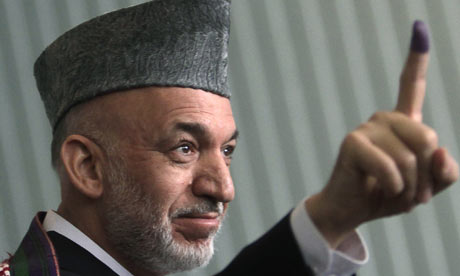 In my
In my 
 Here in the US, Wednesday the 19th is winding down. In Afghanistan, Wednesday the 19th has already happened. It is a funny thing to think that a place half the world away is experiencing what we would consider the future. However, in the early hours of election day in Afghanistan (it is after 1 am on Thursday the 20th at the time of this writing), two things have become clear: there will be
Here in the US, Wednesday the 19th is winding down. In Afghanistan, Wednesday the 19th has already happened. It is a funny thing to think that a place half the world away is experiencing what we would consider the future. However, in the early hours of election day in Afghanistan (it is after 1 am on Thursday the 20th at the time of this writing), two things have become clear: there will be 
 Thursday in Afghanistan promises to be a day of reckoning for not only Hamid Karzai and his government but also for larger Western efforts to turn a state that's existed in a haphazard tribal system for centuries into a functioning democracy. Karzai is running for his second term as Afghanistan's President since he was hand picked by the US, then under President Bush, for his charismatic and strong political nature. However, since he won the first Presidential election in 2004,
Thursday in Afghanistan promises to be a day of reckoning for not only Hamid Karzai and his government but also for larger Western efforts to turn a state that's existed in a haphazard tribal system for centuries into a functioning democracy. Karzai is running for his second term as Afghanistan's President since he was hand picked by the US, then under President Bush, for his charismatic and strong political nature. However, since he won the first Presidential election in 2004, 
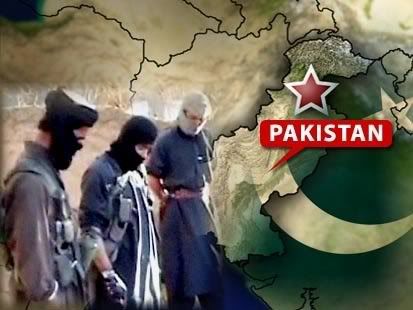
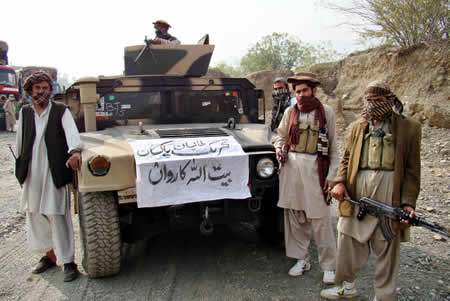






 Over the past couple of days, stories about what has happened to the protesters arrested in Iran have begun to emerge. Here in the US, we enjoy great freedom when it comes to protesting being that it is a guaranteed right under our constitution. We can assemble a protest on any sidewalk in any city and expect that the most that would be hurled at us would be insults. Not so in Iran where in the weeks after the recent election many protesters have been killed and many more have been jailed and beaten.
Over the past couple of days, stories about what has happened to the protesters arrested in Iran have begun to emerge. Here in the US, we enjoy great freedom when it comes to protesting being that it is a guaranteed right under our constitution. We can assemble a protest on any sidewalk in any city and expect that the most that would be hurled at us would be insults. Not so in Iran where in the weeks after the recent election many protesters have been killed and many more have been jailed and beaten.




 Today, Vice President Biden appeared in Tbilisi, Georgia both to revisit the conflict between Georgia and Russia and to implicitly and explicitly show where the US stands. Nearly one year ago, August 2008, it's the start of the Beijing Olympic Games. But, the headlines were dominated by another more sinister incident: "Beijing wow's world, Moscow rolls tanks." In what seemed to be entirely surreal and completely out of the blue to nearly everyone, Russia had utilized it's entire war machine to invade and devastate a country with a land mass ratio of 245:1 (Russia 17,075,200 sq/km : Georgia 69,700 sq/km). This incident, however unexpected, was clearly brewing if one had seen the warning signs.
Today, Vice President Biden appeared in Tbilisi, Georgia both to revisit the conflict between Georgia and Russia and to implicitly and explicitly show where the US stands. Nearly one year ago, August 2008, it's the start of the Beijing Olympic Games. But, the headlines were dominated by another more sinister incident: "Beijing wow's world, Moscow rolls tanks." In what seemed to be entirely surreal and completely out of the blue to nearly everyone, Russia had utilized it's entire war machine to invade and devastate a country with a land mass ratio of 245:1 (Russia 17,075,200 sq/km : Georgia 69,700 sq/km). This incident, however unexpected, was clearly brewing if one had seen the warning signs.

 More than a month ago, Ahmadinejad emerged the victor from a hotly contested election, successfully winning his bid for re-election despite great protest and amidts claims of ballot rigging. The world watched as the dictatorial regime unleashed the Basij militia in a savagely violent crack down on Iranian citizens protesting the election outcome. With at least twenty dead and scores more injured and imprisoned (the Iranian government is sure to have manipulated the official numbers), Ahmadinejad seems to have strengthened his grip on the Iranian nation and bolstered his monopoly of power with Ayatollah Khamenei.
More than a month ago, Ahmadinejad emerged the victor from a hotly contested election, successfully winning his bid for re-election despite great protest and amidts claims of ballot rigging. The world watched as the dictatorial regime unleashed the Basij militia in a savagely violent crack down on Iranian citizens protesting the election outcome. With at least twenty dead and scores more injured and imprisoned (the Iranian government is sure to have manipulated the official numbers), Ahmadinejad seems to have strengthened his grip on the Iranian nation and bolstered his monopoly of power with Ayatollah Khamenei.

 On friday, two American luxury hotels in Jakarta, the JW Marriott and the Ritz Carlton, were attacked by suicide bombers. Although no one has claimed responsibility for the attacks yet, the initial invesitgation by Indonesian authorities links the terrorists to a small Jemaah Islamiyah splinter group lead by a notorious terrorist known as Noordin M. Top. According to the AP, Top, an explosives specialist, has been linked to several previous bombings in Indonesia including the same Marriott and the Australian embassy. Jemaah Islamiyah has also been linked with Al Qaeda.
On friday, two American luxury hotels in Jakarta, the JW Marriott and the Ritz Carlton, were attacked by suicide bombers. Although no one has claimed responsibility for the attacks yet, the initial invesitgation by Indonesian authorities links the terrorists to a small Jemaah Islamiyah splinter group lead by a notorious terrorist known as Noordin M. Top. According to the AP, Top, an explosives specialist, has been linked to several previous bombings in Indonesia including the same Marriott and the Australian embassy. Jemaah Islamiyah has also been linked with Al Qaeda.


